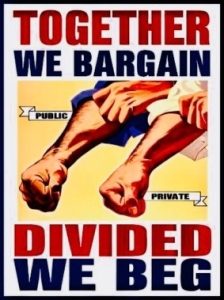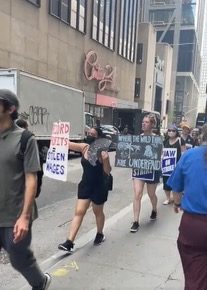“Unions may finally have the energy to reverse their decades-long decline” declared Steven Greenhouse as he opened an online forum July 28 on the current surge in union activity and prospects for the future. Outlining the new labor activity, Greenhouse, a senior fellow at the Century Foundation which sponsored the event, cited the 68 percent approval ratings unions are now receiving, the highest in more than 50 years.
He recounted the drive for unionization in the past year or two at Amazon, Starbucks, Apple, Chipotle, museum workers, hospital workers,, university graduate school workers, and so many others. “Never have I seen such pro-union sentiment in my lifetime,” he declared. Among people ages 18 to 34, 77 percent approve of unions and three out of four say they [embedyt] https://www.youtube.com/watch?v=nXg1EsPS_GE[/embedyt]would join a union if they could. The question now is “what can be done to build on this moment,” he said, in the face of “corporate America’s ferocious opposition to unions. Are the nations major unions doing enough to help rev things up? Can this promising moment be built up to be a truly lasting movement?
Citing the new enthusiasm and energy in the current union drives, Sara Nelson, president of the Association of Flight Attendants and one of the panelists, quoted Mother Jones, the legendary labor organizer who campaigned for workers to join unions back in the days when workers were being killed for it. “You will fight and lose, you will fight and win, but you must fight. If you don’t fight, you can’t win. If you don’t try, you can’t win,”
The forum, featured, in addition to Nelson, Chris Smalls, president of the Amazon Labor Union; Jaz Brisack, a union organizer at Starbucks; and Joseph McCartin, professor of labor history at Georgetown University. The panel was moderated by Harold Myerson, editor-at-large of The American Prospect, and Steven Greenhouse, senior fellow at The Century Foundation.
The panelists highlighted several key points about the current surge in union activity. Smalls spoke of the importance of grass-roots organizing, with worker speaking to worker about the benefits of collective bargaining. “Listening and finding out what most concerns your fellow workers and talking about how these concerns can be addressed by collective bargaining,” he said, “was more effective than organizing from the top down by outside organizers sent in by a union.” Amazon showed the importance of creating a “union culture” where we show that “we care for one another where workers lean on each other for support.”
His point was emphasized by Brisack who noted from her experience that “Like all workers, Starbucks workers are an incredible source of energy” for organizing at the grass roots. This was important at a company like Starbucks which poses as a company with progressive values on issues like race and climate change.
But, said Brisack, we came to workers with the message that you betray these values “if you don’t also have union values.” This was important in the face of Starbucks responding with their “scorched earth” union busting tactics. Both Smalls and Brisack told of some of the union-busting tactics they encountered and how they counteracted them. They spoke of the forced meetings where management representatives harangued them with falsehoods about unions. Brisack told of several management people surrounding individual workers and intimidating them into voting against the union. Smalls enumerated some of these “disgusting” tactics: demonizing unions, isolating workers from each other, drilling them with captive audience meetings – there have been some 3,000 such meetings at Amazon, he noted.
One point noted by the panelists is the extent to which current union organizing is being driven by young workers who are striving for a better future than the one now offered by low-paying jobs and stressed working conditions. They want a voice in their workplace and are not content with being told that “if you don’t like it here, find another job.”
At the same time, all the panelists as well as the moderators strongly emphasized the need for the support of the established labor movement to help carry through the fight against the multi-billion dollar corporations these new unions are up against, particularly when they now have to force the  companies to the bargaining table and negotiate a good contract. Brisack spoke of the gratitude Starbucks workers felt when other unions opened their union halls for her new union and offered other measures of support.
companies to the bargaining table and negotiate a good contract. Brisack spoke of the gratitude Starbucks workers felt when other unions opened their union halls for her new union and offered other measures of support.
Workers have to be told that they may need to use the ultimate weapon – to strike – if they have to in order to gain a fair contract, both Nelson and Brisack noted. “The labor movement has enormous resources and funds,” observed Nelson, “and this moment is too important to them to let it pass by.”
Nelson, who spoke from her experience of a number of years leading airline flight attendants, talked of then need to define the union struggle for the public so they understand the issues and the stakes in it. This is especially true since these giant corporations have so much money and resources to influence public opinion.
She also emphasized the importance of political action to pressure politicians to act. “Now,” she said, “people with money are the ones pressuring politicians. We have to put enough organized pressure the other way. If Amazon refuses to negotiate with the union,” for example, we should let Biden know that he “should pressure Jeff Bezos to sit down at the bargaining table with the union and negotiate a contract.”
But, first and foremost, Nelson declared, organized labor has to get out on picket lines “where workers are taking a stand and striking because workers are seeing that with a union you can make a difference.”
Amazon union website; Starbucks workers website, Century Foundation website



